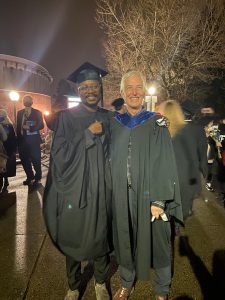I am so excited to write this! Words cannot fully capture the impact that Douglas Pulleyblank has had on the field of linguistics, on research into African languages, and on my life, as well as the lives of those around me and the field more broadly. While I cannot fully capture everything with words, I will share a few examples from a personal perspective.
I met Doug at the WALC Conference, held at the University of Ibadan from July 29 to August 2, 2013. He was with Akinbiyi Akinlabi, having ògì and àkàrà for lunch. At the time, I was completing my National Youth Service (NYSC) at the University of Ilorin. I learned that we had both completed our undergraduate studies at the University of Ibadan, where he graduated with a first-class degree in BA Linguistics in 1977. I was also pleased to discover that he had worked at the University of Ilorin after his BA. Doug congratulated me on my conference presentation and encouraged me to apply to a graduate program in linguistics at a North American university, if that was something I was interested in pursuing after my service year. His encouragement and support at that conference played a key role in my decision to apply to UBC for a graduate program in Linguistics.
When I arrived at UBC, I initially intended to continue my undergraduate research on the neural basis of tone perception and production in Yoruba. During my first meeting with Doug there, I shared this plan but also expressed an interest in working on the phonological description, analysis, and documentation of other Nigerian languages beyond Yoruba, which is relatively well-documented. With his encouragement, I shifted my focus to language documentation and concentrated on Fungwa, an endangered language with about 1,000 speakers in Nigeria, for my PhD thesis. Doug was always available to help and consistently stepped up for me and other students at UBC and beyond. There were times when I wanted to drop out of the program, but his unwavering support and encouragement kept me going. He instilled confidence in me by offering numerous opportunities, including serving as his research assistant and coordinating his research lab on the vowels of West African languages.
As my supervisor, Doug gave me the intellectual freedom to grow into my own person while providing guidance on staying focused. He believed in building bridges and creating connections whenever possible. He encouraged me to stay grounded in my social and academic roots in Nigeria and other West African countries and, most importantly, provided the moral and material support needed to do so. For instance, every time I travelled to Nigeria for language documentation, I would often start new projects based on what I found interesting or fun, usually at the intersection of language, music, and verbal art. When I returned to Vancouver and shared these projects with him, he would reimburse my expenses from his research funds.
To make research at Nigerian universities more visible, I began working with Agnes Legbeti and some undergraduate students in Nigeria to digitize and archive MA and PhD theses from the University of Ibadan. I mentioned this to Doug, and without hesitation or many questions, he provided funding to pay the research assistants and purchase the necessary materials. During the COVID-19 pandemic, I also told him about my efforts to translate the prevention guidelines into Yoruba. Again, he refunded my expenses and provided funding for Musa Toheeb, an undergraduate research assistant at the University of Lagos, to support the translation. Doug taught me that the best way to move forward is to bring others along with you and never burn bridges. My academic journey in North America has only been possible because of Doug's intellectual guidance and contributions, mentorship, kindness, and his ability to see the good in everyone and every situation.
Doug once told me that people in Ibadan named him Kọ́láwọlé, which means “he who brings nobility, wealth, and honour into the house.” In Yoruba culture, we believe that names reflect who we are. Based on what I know about Doug and my experience as his mentee, he truly lives up to this name. He is a noble and honourable person whose wealth of knowledge has deeply enriched the field of linguistics and communities around the world.
Thank you, Doug, for being the embodiment of what a teacher and mentor should be. As you retire, I wish you strength and a sound mind to enjoy all the best the universe has to offer.
Congratulations on your retirement!

Dear Kayode,
What a wonderful tribute to Doug!! I even learned something I did not know about him -I knew he was supporting students through grants but had no idea how or whom!! He is so humble. You are a very important person in Doug’s life; he only has positive things to say about you…. And might as well mention it now, but we also love Yewande’s mother Moin-Moin🤣
Anne-Marie